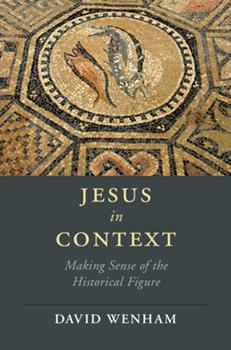Q. Sometimes scholars tend to say that history and archaeology can help us with the context of Jesus, but not with the content of his story. I don’t agree with this limitation, but I will say that there are not a lot of direct connections between persons mentioned in the stories about Jesus, and archaeological evidence such as the Pilate inscription, but there are some. I’m still convinced the inscription on the James ossuary is genuine, as the epigraphers continue to say, and this provides some significant evidence that needs to be taken into account. Do you have an opinion about the authenticity of the James ossuary?
A. I am afraid that I am wholly dependent on others wiser and more knowledgeable than I, you included Ben, for this sort of judgment. I recall being in Jerusalem in 1990 when the Caiaphas ossuary was found – which was very exciting, but again there is some debate about whether it definitely is Caiaphas as in the gospels ! Despite questions – and scholars question everything! – I see archaeological evidence as really important and illuminating, and I appreciate the work of Craig Evans, Richard Bauckham and many others. One of the first things I say in my book is that we really do know a lot about the Roman and Jewish world of Jesus: it is not a world lost in the distant mists of time.
Q. The book is well written and nicely divided up into two major parts. At a couple of points in parts one and two of the book you seem to suggest that Jesus had a baptizing ministry like John’s early on in his ministry. But surely John 4.2 denies this for Jesus but admits some of his disciples were baptizing people like John did. Could this not be because as the 4th Gospel seems to suggest, some of Jesus’ disciples were formerly John’s disciples? In any case, I don’t think we can assume that Jesus viewed baptism the same way John did, as a baptism of repentance for Jews who had sinned or lost their way. In any case, the later way baptism is mentioned in the NT in Rom. 6 and elsewhere suggests that Christian baptism was specifically associated with burial with Christ, burial of the old self. In other words, Christian baptism was done in light of the Christ event, particularly what happened at the end of his earthly life. Even more clearly, Acts 18 and 19 clearly distinguish John’s baptism which is seen as insufficient for ‘the Way’ and Christian baptism. Finally, 1 Cor. 1 and 12 suggest that water baptism was not seen as the same thing as reception of the Spirit, which Paul refers to the Spirit baptizing persons into the body of Christ, while in the same letter thanking God he had not water baptized more Corinthians since they misunderstood its significance. Comments of these things?
A. Wow, that is a big question! I see the relation of Jesus and John the Baptist as very important historically and theologically. You are of course right that some of John’s disciples became Jesus’ disciples, though I am not sure if their history with John would make them continue his baptizing work when they transferred to Jesus, if Jesus was not in favour of it! I take it that Jesus was a ‘baptist’ (John 3:25,4:1) even though the hands-on work of baptizing was done on his behalf by his disciples (as was probably also the case later with Paul and his team of companions). I think there is some reason to think that Jesus’ baptizing may have been embarrassing to early Christians, since it could be argued, and may well have been argued by some followers of John the Baptist, that the one who baptizes is greater than the one baptized; Jesus could have been seen as John’s disciple, as ‘he who comes after me’. John’s gospel clearly wants to refute that idea; see John 3:26-36, and I suspect that John 4:2 is the evangelist distancing Jesus from John in response to this discussion. We see not only John, but also Matthew responding to the same sort of question in 3:13-15. (see the writings of two people I have worked with: R.T. France on ‘Jesus the Baptist’ in Jesus of Nazareth, eds Green and Turner, also Daniel Sefa-Dapaah An investigation into the relationship between John the Baptist and Jesus of Nazareth : a socio-historical study 1995.)
I certainly agree that Christian baptism, especially post the death and resurrection of Jesus and post the pouring out of the Spirit at Pentecost, took on very important extra connotations by comparison with John’s baptism of repentance. But I am not sure that there is discontinuity: the most important thing about John’s baptism was that he was proclaiming the imminent coming of God’s promised kingdom, inviting people to get ready for it. And Jesus’ ministry had the same focus, only with Jesus announcing the actual arrival of the kingdom.. I take it that Jesus got baptized by John, not for the forgiveness of his own sins, but to identify with John’s eschatological kingdom/righteousness movement, which he was going to take forward in wonderful and extraordinary ways; see Matt 3:15 on his calling to ‘fulfil all righteousness’.
I see the connection between conversion + water baptism + Spirit baptism in early Christian thinking as close, contrasting with much modern baptismal practice in which conversion and baptism are often widely separated. Water baptism was the way that converts expressed their commitment to Jesus as Lord, and it was a dramatic and ‘spiritual’ experience – dying to one’s old life and community and rising into new life with Jesus and in his community; it was typically accompanied by powerful experiences of the Spirit. I don’t think Paul had any reservations about the importance of baptism, except when it encouraged party-spirit and a focus on the baptizer – hence his remarks in 1 Corinthians 1. I enjoyed Nicholas Taylor’s book Paul on Baptism: Theology, Mission and Ministry in Context.












